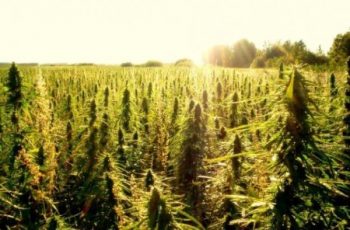March 31st, 2017
Guest writer for Wake Up World
The West Virginia House has unanimously passed a bill that would significantly expand the state’s hemp licensing program, opening the door for anybody in the state to produce or process industrial hemp for commercial purposes. Final approval would set the foundation to end federal prohibition in practice.
Del. Jeff Eldridge (D-Alum Creek) and Del. Jim Butler (R-Henderson) introduced House Bill 2453 (HB2453) on Feb. 15. The legislation would remove language in the current hemp licensing program restricting it to the Department of Agriculture and state institutions of higher learning. Under the proposed law, any person with a license could plant, grow, harvest, possess, process, sell, and buy industrial hemp.
The licensing program is “shall issue,” meaning the Department of Agriculture would be required to issue a license to any person meeting statutory requirements. Without this section, the department could deny applications for a myriad of reasons.
HB2453 passed the House by a 99-0 vote.
[pro_ad_display_adzone id=”110028″]
“I think West Virginia is kind of in the center; we could have the industry move here to process hemp, the plant itself, and extract all of the derivatives from the plant you can,” Eldridge said in an interview.
West Virginia Public Broadcasting reported that the limits of the current program, due to its conformity with federal law, has hindered the development of a hemp industry.
“But because of the strict requirements under the 2014 bill, growers are not able to sell their plants and cannot transport them across state lines to be turned into those usable products. That’s limited the ability to create a real hemp industry in the state.”
Federal Farm Bill
Early in 2014, President Barack Obama signed a new farm bill into law, which included a provision allowing a handful of states to begin limited research programs growing hemp. The “hemp amendment”:
“… allows State Agriculture Departments, colleges and universities to grow hemp, defined as the non-drug oil-seed and fiber varieties of Cannabis, for academic or agricultural research purposes, but it applies only to states where industrial hemp farming is already legal under state law.”
In short, current federal law authorizes the farming of hemp – by research institutions only, for research only. Farming for commercial purposes by individuals and businesses remains prohibited. However HB2453 ignores federal prohibition and authorizes commercial farming and production anyway.
HB2453 now heads to the Senate for further consideration.
Other States
By rejecting any need for federal approval, HB2453 sets the stage to nullify the federal hemp ban in practice. West Virginia could join with other states – including Colorado, Oregon, Maine, Massachusetts, California and Vermont – that have simply ignored federal prohibition and legalized industrial hemp production within their state borders.
While prospective hemp growers would still have to take federal law into consideration, by eliminating the state requirement for federal permission, the West Virginia law would clear away a major obstacle to widespread commercial hemp farming within the borders of the state.
Farmers in SE Colorado started harvesting the plant in 2013, and farmers in Vermont began harvesting in 2014, effectively nullifying federal restrictions on such agricultural activities. On February 2nd, 2015, the Oregon hemp industry officially opened for business and one week later, the first license went to a small non-profit group. As more people engage in hemp production and the market grows within these states, more people will become emboldened creating an exponential wave, ultimately nullifying the federal ban in effect.
Huge Market for Hemp
According to a 2005 Congressional Research Service report, the U.S. is the only developed nation that hasn’t developed an industrial hemp crop for economic purposes.
Experts suggest that the U.S. market for hemp is around $600 million per year. They count as many as 25,000 uses for industrial hemp, including food, cosmetics, plastics and bio-fuel. The U.S. is currently the world’s #1 importer of hemp fiber for various products, with China and Canada acting as the top two exporters in the world.
During World War II, the United States military relied heavily on hemp products, which resulted in the famous campaign and government-produced film, Hemp for Victory!
About the author:
Driven by a desire for accuracy, chef and alternative news stalwart Ryan Cristián has a passion for the Truth. As founder and Editor-in-chief of The Last American Vagabond, he understands that Americans want their news to be transparent, devoid of the opulence frothed out by today’s Corporate Media. A cultured and insightful man with a worldly sense, Ryan’s unjaded approach offers common sense to the individual racked by the ambiguous news cycle – a vicious and manipulative merry-go-round that keeps trenchant minds at a manageable distance from the truth. Avid writer and editor by day, Truth seeker by night, Ryan’s reality defines what it means to be current.
“Living is easy with eyes closed, misunderstanding all you see.” – John Lennon
You can follow Ryan’s work at:
- Website: www.thelastamericanvagabond.com
- Facebook: www.facebook.com/TheLastAmericanVagabond
Respect and gratitude to our friends at The Last American Vagabond, where this article first appeared.
Recommended articles by Ryan Cristián:
- Top 10 Signs Americans are Living in a Police State
- Debunked: 10 Myths About Marijuana That No-One Should Believe (and Why)
- Media Bias and the Illusion of Democracy
- The Myth of Authority
- The Divide and Conquer Agenda – The Role of the Agent Provocateur
- Stay the Course: The Fight For Marijuana Legalization Continues
- The Divide of the Uninformed American
- The Culmination of Culinary Cannabis Creations
- ALS Patient Treated with Medical Marijuana Outlives Anti-Marijuana Doctors
- Tit-for-Tat Politics, Vault 7, and the Political Distraction Game
- The False Majority: The Lie We Tell Ourselves About America
[pro_ad_display_adzone id=”110027″]








